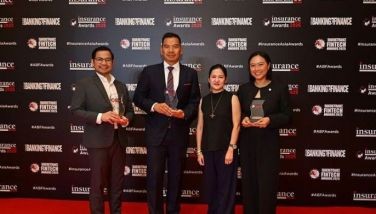Dr. Jette Gabiola & the ABCs of healthcare
MANILA, Philippines - The idea to set up a non-profit organization called ABCs for Global Health came about because of my personal experience and immersion in medical missions,” says Dr. Julieta “Jette” Gabiola, clinical associate professor of medicine at Stanford University and co-author of the book Patient Focused Assessment: The Art and Science of Clinical Data Gathering. “I saw that volunteers sincerely wanted to give their time and resources. But I felt that we weren’t accomplishing anything that was sustainable because there was no continuity of care. There are thousands of medical missions conducted each year, many of them in the Philippines, but the reality is that unless we can somehow address poverty and psycho- social issues, we will not be able to have positive long-term health outcomes.”
The doctor notes that surgical medical missions (for the one-time repair of cleft lip and cleft palate, circumcision, hernia operations, removal of cataracts, etc.) seem to have better outcomes overall. The opposite holds true in the treatment of chronic disease, where there is the usual problem of patients selling or trading their supply of free maintenance medications for their family’s food and other immediate necessities. “We know that this happens when we give three or four months’ worth of medicines, but we have no choice but to give it anyway,” Dr. Gabiola rues.
To be able to improve the quality of medical care, provide continuity, and discourage patients from selling their free medicines, Dr. Gabiola posits that frequent follow-ups should help. But recognizing that many disadvantaged patients will have difficulty to raise even the bus or jeepney fare to get to a doctor, she believes that it would be benefit patients greatly if a physician is able to regularly visit their communities instead.
Thus, one key project of ABCs for Global Health is to custom-fit vans or buses that will serve as medical mobile clinics. The object is to raise US$100,000 (approximately P4.3M) to buy and customize each mobile clinic. “The medical expertise is available here,” says Dr. Gabiola. ”But apart from the cost of the mobile clinic, something has to be set aside to buy fuel for the bus and pay the salary of a dependable driver.”
Perhaps a regular honorarium could be given to full-time physicians, too, because there are very few doctors who can volunteer for extended lengths of time. “Volunteering gives short-term fulfillment (to doctors) because they are able to give direct care. But volunteers are able to help out for a limited time,” Dr. Gabiola agrees. “(Volunteering) doesn’t impact their yearly schedules.” But while there is nothing wrong with that, a full-time physician is vital to the success of any health program. Otherwise follow-ups will be intermittent and donations of medicines will be wasted (and potentially dangerous) if no one who knows exactly what the drugs are for (and how to dispense them) is around.
“The purpose of ABCs for Global Health is to address basic healthcare needs and improve quality of life,” shares Dr. Gabiola.
She tells us that ABC is an acronym for “Advocacy, Betterment and Commitment” for global health. She admits, “While I know that the volunteer work I will be doing will be for the Philippines, I thought I’ll leave it open just in case I could collaborate with other people perhaps in other countries. Our programs will be geared towards prevention of disease, immunization, health diagnosis, continuity of care, education, and data gathering (or building health registries).”
The non-profit organization likewise seeks links with local health practitioners, medical societies, and even government health units to identify and give aid to communities that need the most help.
The task that Dr. Jette Gabiola has taken upon herself is certainly difficult, but she is undaunted. She knows from firsthand experience that with enough determination, her project will succeed. She has overcome numerous, seemingly insurmountable hurdles before.
“I knew that I wanted to be a doctor in high school. But being ninth in a family of 10 children, I knew we couldn’t afford it so I set my sights on a nursing course instead,” she relates. “I pleaded so that my parents would pay tuition only for my first quarter at Far Eastern University (FEU). I told them I would win a scholarship and make my own way through college.”
She kept her word, finished nursing in 1972 through scholarships and found work in the United States. With her savings set aside while working as a nurse, she took a pre-med course (BS Biology, Roosevelt University in Chicago Illinois) and proceeded to get her medical degree (Doctor of Medicine, Rush Medical College, Chicago, Illinois) before specializing in Internal Medicine at Stanford. She lost her husband, also a physician, to pancreatic cancer 17 years ago and raised two children as a single mother. But the determination and hard work has paid off, her children are grown up, and there is more time to pay it forward.
“I was born in the Philippines and I grew up poor so I always wanted to give back,” says Dr. Jette Gabiola. With colleagues from Stanford, she was among the first volunteers deployed to the typhoon Yolanda calamity area last year. But she has decided to extend herself even more. “If one looks at all the problems, it is easy to be overwhelmed. This is why I am focusing only on one thing — health. Specifically, how we can coordinate volunteer work, goodwill, and donations to provide continuity of care to those who need it most.”
* * *
To learn more about ABCs for Global Health, log on to www.abcsforglobalhealth.org. Or e-mail Dr. Julieta “Jette” Gabiola at jgabiola@stanford.edu




















